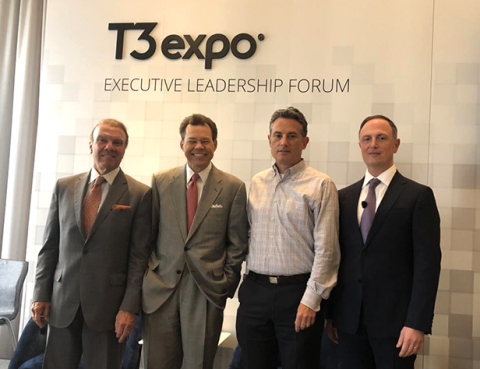More Associations Need Strategic Plans for Events, Reports T3 Expo Survey

Many associations do not have a strategic plan for their events, according to a survey of more than 100 association leaders and decision-makers conducted by general service contracting company T3 Expo. This finding and more were revealed and discussed at length at the company’s 2ndAnnual Executive Leadership Forum, held Oct. 10 at the W Washington D.C. hotel in Washington, D.C.
The annual survey focuses on critical issues necessary for trade show success, growth and increasing revenue. Conducted along with Heidrick & Struggles, an executive recruitment and placement firm, and Professor David Rehr at George Mason University, the survey was designed to help address the most pressing issues on the minds of association CEOs, directors and heads of events that could be discussed in an open forum.
“Associations and professional society are facing the same challenges that many other enterprises are also facing: growing revenue while reducing costs,” said Chris Valentine, chief executive officer of T3 Expo. “T3 Expo, along with our partners at Heidrick & Struggles and George Mason University, created this study to uncover some of the best practices used in trade shows all across the U.S. and how others can learn from our findings.”
According to the survey, 72 percent of respondents said that their trade show’s growth is important to the overall strategic plan of their organization. However, nearly half (49 percent) do not have a strategic plan in order to achieve that objective.
Of those that do have a plan, 41 percent do not have metrics, while of those with metrics, 20 percent don’t communicate them to staff members. Meanwhile, more than two-thirds of those surveyed either don’t have a plan or metrics.
Three-quarters of the survey’s respondents have held positions of director level or above, while the remaining surveyed were CEOs. In addition, 64 percent identified their role as events management and 36 percent identified as association leadership. The association type that was surveyed was split between 501(c)3 at 56 percent and 501(c)6 at 44 percent.
The majority of respondents had budgets under $10 million, 45 percent had budgets under $5 million, and only 9 percent had budgets over $60 million.
According to Tim Heffernan, T3 Expo chief development officer, the survey makes clear that having a strategic plan is critical in order to increase growth and revenue for the associations industry. Setting the right expectations among staff will likely lead to greater revenue available to the organization, while higher expectations among team members and long-range revenue goals could help lead to higher revenue performance, he added.
“Nearly half of our survey respondents didn’t have a plan, and this was a deterrent to hitting their metrics and achieving their goals,” Heffernan said.
The survey findings also asserted that association leadership still equate attendance with success, with executives saying that their board’s first priority when assessing measurement was the number of attendees at a show, followed closely by net square footage sold.
By a factor of three to one, respondents said overall attendance was more important than qualified attendance, with the majority of respondents also stating that reinforcing and building existing relationships was more important than making new contacts and sharing best practices.
To learn more about metrics, government relations role at shows and overall show margin, request a copy of the survey report from T3 Expo here.
Don’t miss any event-related news: Sign up for our weekly e-newsletter HERE and engage with us on Twitter, Facebook, LinkedIn and Instagram!


Add new comment